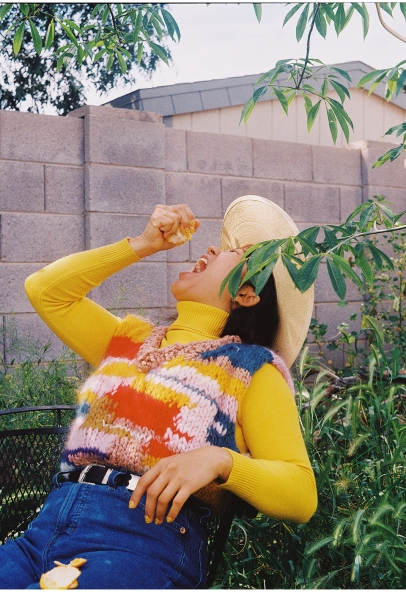What Alice Waters Taught Me
My dad’s well-loved copy of Alice Waters’ The Art of Simple Food was always kept within arm’s reach on the top shelf. It sat there next to his French press and a bowl of ripe tomatoes fresh from his garden, its pages yellowed with age and heavy use. He’d often flip it open to the prelude, drawing inspiration for breakfast while the rest of the world was still waking up. Despite the vast array of cookbooks available, this was his one and only — he simply didn’t find the others engaging or worthy of preserving.
“Finally, someone understands,” he’d say to me.
His acre-lot property in the middle of Gilbert is a slow heartbeat of life amidst our city’s chaos. His fences are lined with citrus trees, sour grape vines, pomegranate seedlings, newly planted banana trees and honeycrisp apple trees that my husky dog loves to nestle under when she visits for a play date. His way of life is minimal by choice; he hardly visits a grocery store, as he prefers to eat the fruits of his backyard labor for plentiful snacks, juices, and post-nap energy. Occasionally, he’ll visit the Mercado on Stapley Drive for a clean cut of ribeye to grill and tear it into its leathery texture for added sustenance throughout the week. He’s constantly reminding me of the benefits of slow, uncomplicated living; always romanticizing even the slightest morsels of life as tokens of gratitude.
Dad never really saw himself as a seasoned cook. I can’t remember him being especially fond of making a particular dish or concretely recording family recipes from our German relatives. His garden bed remains his pride and joy, evidence of his appreciation for simple pleasures like the taste of unsalted butter melted on fresh sourdough bread; or serrano peppers dried and crushed to a spicy powder. He never bothered with the New York Times’ overly complex recipes or exotic components featured in dishes on the Food Channel. Instead, he preferred appreciating the simplicity and individuality of each ingredient. “It’s never about the pasta sauce; it’s about the tomato,” he’d always say. Thus, I’ve become fond of The Art of Simple Food as much as he — a bible for honest homesteading and the additional benefits of a seasonally sourced diet.
Alice Waters is renowned for her unique and flavorful dishes spotlighting locally sourced, seasonal foods. Her work is a heartfelt tribute to a cooking style merging old-world nostalgia with innovative approaches. It’s far from intimidating — it’s welcoming and accessible. She stands tall in her capacity to capture the earthy familiarity of kitchens past, reminding us of how our grandmothers used to cook. Waters’ philosophy is a passionate homage to an inherent understanding of food, showcasing a deep comprehension of how ingredients function and how they harmoniously blend to craft tasty, cozy dishes.
Because food is simple, everything else is fanfare.
And despite Alice’s incredible dedication to simplicity and avoidance of high-brow fluff, she famously resides as an all-star Michelin-star chef in Berkley, California. Living proudly in the culinary world’s counterculture movement within one of our country’s food meccas, she once read aloud in an interview: “If we make a mistake, we’ll give people something else to eat. If you burned the corn soup, you called it grilled corn soup.” She takes great pride in her collaborations with friends. She views teamwork as a celebration, where errors are seen as opportunities for growth, and the final product is always more significant than the sum of its individual parts.
Her life’s work has been dedicated to making food accessible to everyone; a no-frills approach to delicious cooking and gardening techniques for those without ample yard space. A staunch advocate for farmers who lovingly cultivate the land, she also aims to teach children about the virtues of slow food and its cultivation process through her renowned Edible Schoolyard Project. In 1992, Alice Waters became the first woman to be awarded the title of “Best Chef in America” by the James Beard Foundation and she later received their Humanitarian Award. In 2009, she was inducted into the French Legion of Honor, a nod to the origin of her lifelong passion. She is a force to be reckoned with and a true inspiration.
If you entertain a notion long enough, there comes a time when you either act on it or let it be. After years of absorbing my father’s and Waters’ shared passion for a back-to-basics philosophy about food and lifestyle — I began to pay closer attention. Farm-to-table eating isn’t about the fertile soil of a tomato bed; it’s about appreciating nature’s equilibrium, elegance, refinement and wisdom. When we chew our food slowly, our senses are awakened and each bite becomes a part of a narrative, allowing us to relish the beginning, middle and end. It’s impossible to enjoy the beauty of fresh produce without recognizing its humble yet equally gritty beginnings.
It wasn’t until I grew older and finished college that I began seeing my father’s fruit trees in a new light. He loves when I ask now about proper irrigation practices or fish mulch-to-nitrogen ratios for the peach orchard.
Since stepping into our independent life, my husband and I have embarked on an intimate journey of home transformation — stripping our beloved abode to its bones and breathing new life into it. Our kitchen, a haven in progress, promises a blend of beauty and function, with every dish and tool carefully chosen. I thrifted a charming wooden bowl, soon to grace our handcrafted oak island, cradling the bounties of our garden. My father’s three-tiered metal basket, destined for our windowsill, awaits homegrown peppers and snap peas to complement our pantry of nuts and beans. Every corner of our home proudly displays the fruits of our labor, with vibrant and natural hues reflecting our dedication to the Arizona soil.
Life in the Carrasco household extends beyond indoor chores because growing your own produce and choosing to live off simple recipes is a choice that requires daily practice. Each morning, I’m drawn to our flourishing garden, tending to the carrots, watermelons, tomatoes, eggplant and fruit trees that stand quietly in the cool shadow of our neighbor’s ash tree. Our yard breathes and demands constant care, and I’m forever grateful that I chose a life partner who treasures this nurturing life, mirroring the simplicity and depth I’ve always admired in my father.
After hearing the passion behind my father’s mantras, it didn’t take much convincing for me to take note; my appreciation for his enthusiasm came around full circle. I owe the success of my thriving nursery and blossoming hobby as a gardener to his foresight and wisdom.





